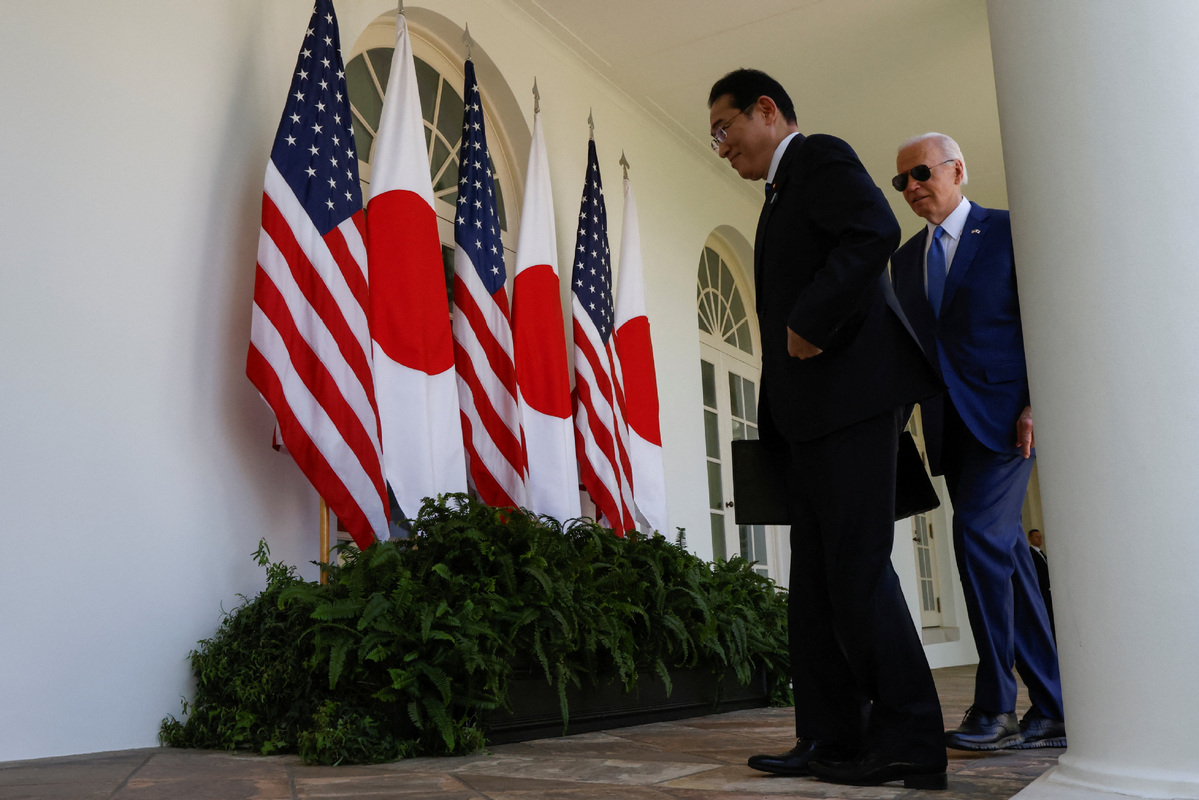Small clique politics draws firm opposition
US-Japan ties should not undermine peace and stability, China says


The relationship between the United States and Japan should not target any other countries, harm their interests or undermine peace and stability of the region, Chinese Foreign Ministry spokeswoman Mao Ning said on Thursday, emphasizing China's strong opposition to small-clique politics.
The remarks came after the two allies attacked and smeared China on the Taiwan question, and maritime and other issues during a summit in Washington, DC, on Wednesday, where US President Joe Biden and Japanese Prime Minister Fumio Kishida unveiled plans to strengthen their alliance.
"In disregard of China's severe concerns, the US and Japan grossly interfered in China's internal affairs and seriously violated the basic norms governing international relations," Mao told reporters at a regular news briefing in Beijing.
Mao said China strongly opposes attempts to form small circles motivated by a Cold War mentality, as well as words and deeds that stoke and aggravate conflict and undermine the strategic security and interests of other countries.
The spokeswoman refuted the distortion of truth and facts about China in a joint leaders' statement issued after Biden and Kishida's meeting, saying it is the US and Japan that pose the real threat to regional peace and stability.
Mao said that China's activities in the East and South China Seas are in full compliance with international law and beyond reproach. She added that "China has indisputable sovereignty over islands in the South China Sea and their adjacent waters."
The spokeswoman also said that Biden and Kishida's concerns over China's nuclear policy were nothing but a false narrative that is unfounded and ill-intended.
As China has pledged "no first use" of nuclear weapons and not to use nuclear weapons against nonnuclear weapon states or nuclear-weapon-free zones, Mao said those who do not use nuclear weapons against China have nothing to worry about.
On the contrary, the international community has every reason to feel seriously concerned about Washington's expanded cooperation with its allies to develop advanced military technologies given that the US "possesses the biggest and most advanced nuclear arsenal in the world", she added.
As the US and Japan announced a significant upgrade of their military alliance, insightful individuals in Japan and China urged Tokyo to reexamine its position on Sino-Japanese relations, correct its mistaken understanding of security, and avoid returning to the path of war.
Huang Xingyuan, China's representative director of the Japan-China Friendship Center, said the US is continuously drawing closer to Japan.
According to Huang, Japan is also actively approaching or even binding itself to the "Indo-Pacific strategy" of the US, or what is referred to as a strategy of containment against China. He believes that this trend is worth being vigilant about.
Risk of tensions
The notable upgrade of the US-Japan alliance has raised apprehensions about escalating tensions in the Asia-Pacific region.
"The upgraded Japan-US alliance is highly targeted. This is based on Japan wrongly positioning China as its challenge and threat. Japan has introduced measures under the guise of security to ensure 'absolute security', which may lead to new instability and new dangers," Huang said.
The doubts of the Japanese authorities about China's development, the positioning of Sino-Japanese relations, and the mistaken understanding of security have led to its current actions, he said.
Japanese citizens held a rally in Tokyo on Tuesday, opposing their government's expansion of military power.
Shunkichi Takayama, a lawyer in Tokyo, said he feels as if an invasive war is approaching, which is something that Japanese citizens absolutely cannot allow.
Reflecting on Japanese history, Takayama said he feels like the country is stepping onto a dangerous path that it must never tread upon.
Cheng Yonghua, former Chinese ambassador to Japan, stressed that the Japan-US security treaty cannot replace the Treaty of Peace and Friendship Between China and Japan.
The Japan-US security treaty is a product of the Cold War, he said, and in the post-Cold War era, the alignment of the two countries against third parties does not conform to the current international order, he added.

































